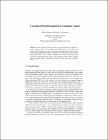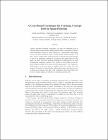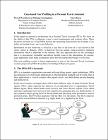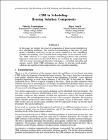Browsing Computer Science Technical Reports by Title
Now showing items 34-53 of 280
-
C** Programmers' Guide
(Trinity College Dublin, Department of Computer Science, 1992-02)The C** extensions to C++ for distributed and persistent programming in C++ are described. -
Calibrating Probability Density Forecasts with Multi-objective Search
(Trinity College Dublin, Department of Computer Science, 2006-02-10)In this paper, we show that the optimization of density forecasting models for regression in machine learning can be formulated as a multi-objective problem.We describe the two objectives of sharpness and calibration and ... -
Call Admission Control and Dynamic Pricing in a GSM/GPRS Cellular Network
(Trinity College (Dublin, Ireland). School of Computer Science & Statistics, 2004-09)In the past decade, the wireless communications market has experienced tremendous growth, and this growth is likely to continue in the near future. In addition to an increase in the number of users, ever more demanding ... -
CapaFS: A globally Accessible File System
(Trinity College Dublin. Department of Computer Science, 1999-09)We have designed and implemented a reference implementation of CapaFS, a global, decentralised file system that allows users to collaborate with other users anywhere in the world, with no prior arrangements or connections. ... -
Case Representation Issues for Case-Based Reasoning from Ensemble Research
(Trinity College Dublin, Department of Computer Science, 2001-03)Ensembles of classifiers will produce lower errors than the member classifiers if there is diversity in the ensemble. One means of producing this diversity in nearest neighbour classifiers is to base the member classifiers ... -
A Case-Based Explanation System for `Black-Box? Systems
(Trinity College Dublin, Department of Computer Science, 2004-06-23)Most users of machine-learning products are reluctant to use the systems without any sense of the underlying logic that has led to the system?s predictions. Unfortunately many of these systems lack any transparency in the ... -
A Case-Based Personal Travel Assistant for Elaborating User Requirements and Assessing Offers
(Trinity College Dublin, Department of Computer Science, 2002-04)This paper describes a case-based approach to user profiling in a Personal Travel assistant (based on the 1998 FIPA Travel Scenario). The ap-proach is novel in that the user profile is made up of a set of cases capturing ... -
Case-Based Plan Recognition in Computer Games
(Trinity College Dublin, Department of Computer Science, 2003)In this paper we explore the use of case-based plan recognition to predict a player?s actions in a computer game. The game we work with is the classic Space Invaders game and we show that case-based plan recognition ... -
Case-Based Reasoning in Scheduling: Reusing Solution Components
(Trinity College Dublin, Department of Computer Science, 1996-08)In this paper we explore the reuse of components of known good schedules in new scheduling problems. This involves accumulating a case-base of good quality schedules, retrieving a case (or cases) similar to a new scheduling ... -
A Case-Based Reasoning View of Automated Collaborative Filtering
(Trinity College Dublin, Department of Computer Science, 2001-03)From some perspectives Automated Collaborative Filtering (ACF) appears quite similar to Case-Based Reasoning (CBR). It works on data organised around users and assets that might be considered case descriptions. In addition, ... -
A Case-Based Technique for Tracking Concept Drift in Spam Filtering
(Trinity College Dublin, Department of Computer Science, 2004-08-17)Clearly, machine learning techiques can play an important role in filtering spam email because ample training data is available to build a robust classifier. However, spam filtering is a particularly challenging task as ... -
Case-Based Travel Agent
(Trinity College (Dublin, Ireland). School of Computer Science & Statistics, 1999-09)With the explosion of the Internet, we are getting more and more information and it becomes difficult to digest. Agents exist to help the users. An agent is a component of software (or hardware) that is capable of ... -
Case-based User Profiling in a Personal Travel Assistant
(Trinity College Dublin, Department of Computer Science, 1999-03)[Introduction] In this paper we present an architecture for a Personal Travel Assistant (PTA). We focus on the ability of this PTA to elaborate a user?s travel requirements and evaluate offers. These decisions are based ... -
CASSANDRA : A Collaborative Anti Spam System Allowing Node Decentralised Research Algorithms
(Trinity College (Dublin, Ireland). School of Computer Science & Statistics, 2003-09)Email has become a critical tool in many people's lives, both professionally and personally. It is easily accessible, inexpensive, fast, versatile and is far-reaching both in terms of the number and spectrum of people to ... -
CBR in Scheduling: Reusing Solution Components
(Trinity College Dublin, Department of Computer Science, 1995-06)In this paper we explore the reuse of components of known good schedules in new scheduling problems. This involves accumulating a case-base of good quality schedules, retrieving a case (or cases) similar to a new ... -
CBR Net :- Smart Technology over a Network
(Trinity College Dublin, Department of Computer Science, 1998-06)CBR (case-based reasoning) has considerable potential for developing intelligent assistants for the World Wide Web. We examine intelligent applications already existent online and find that they can be divided into agent ... -
Class Noise and Supervised Learning in Medical Domains: The Effect of Feature Extraction
(Trinity College Dublin, Department of Computer Science, 2006)Inductive learning systems have been successfully applied in a number of medical domains. It is generally accepted that the highest accuracy results that an inductive learning system can achieve depend on the quality ... -
Clock Synchronization for Multi-hop Ad hoc Networks
(Trinity College Dublin. Department of Computer Science, 2003-09)Clock syncronization is one of the basic requirements of a distributed real-time systems. The greater the precision achievable by the clock synchronization algorithm used, the harder the real-time guarantees that can be ... -
Code Generation with ?Visual Modeller?
(Trinity College Dublin, Department of Computer Science, 1997)?Visual Modeller? is a CASE tool that permits end-users to model business processes, using the associated method ?Visual Modelling?. It is also able to generate the database and a ?front-end? application from this model. ... -
The Cognitive Processes Underlying Complex Analogies: Theoretical and Empirical Advances
(Trinity College Dublin, Department of Computer Science, 1993-10)The psychological investigation of complex analogies (like the solar system / atom analogy) began in the late 1970s and in the intervening period has grown into a prototypical, area of Cognitive Science research. During ...























